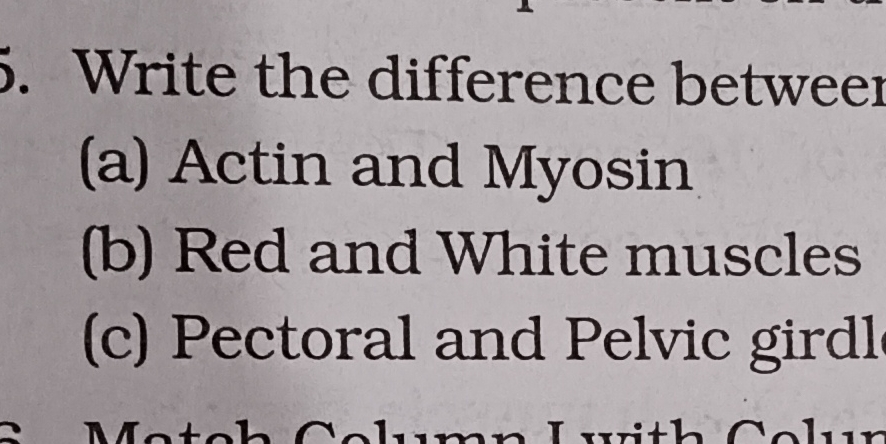Write the difference between: (a) Actin and Myosin, (b) Red and White muscles, (c) Pectoral and Pelvic girdle.

Understand the Problem
The question wants us to list the differences between (a) actin and myosin, (b) red and white muscles, and (c) pectoral and pelvic girdle.
Answer
* **Actin:** Thin protein; **Myosin:** Thick protein. * **Red muscles:** More myoglobin/mitochondria; **White muscles:** Less myoglobin/mitochondria. * **Pectoral girdle:** Upper limbs; **Pelvic girdle:** Lower limbs.
Here are the key differences:
- (a) Actin and Myosin: Actin is a thin contractile protein, while myosin is a thick contractile protein.
- (b) Red and White muscles: Red muscles have more myoglobin and mitochondria, making them efficient for endurance, while white muscles are for rapid, powerful, but short movements.
- (c) Pectoral and Pelvic girdle: The pectoral girdle connects the upper limbs to the axial skeleton, providing flexibility. The pelvic girdle connects the lower limbs to the axial skeleton, bearing weight and providing stability.
Answer for screen readers
Here are the key differences:
- (a) Actin and Myosin: Actin is a thin contractile protein, while myosin is a thick contractile protein.
- (b) Red and White muscles: Red muscles have more myoglobin and mitochondria, making them efficient for endurance, while white muscles are for rapid, powerful, but short movements.
- (c) Pectoral and Pelvic girdle: The pectoral girdle connects the upper limbs to the axial skeleton, providing flexibility. The pelvic girdle connects the lower limbs to the axial skeleton, bearing weight and providing stability.
More Information
Understanding the differences between these biological components is fundamental to grasp the concepts of movement, muscle function, and skeletal structure in animals.
Tips
Students often confuse the roles of actin and myosin or the characteristics of red and white muscle fibers. Remembering actin as the thinner filament and myosin as the thicker one can help. For muscle fibers, focus on myoglobin content and the type of activity they support.
Sources
AI-generated content may contain errors. Please verify critical information